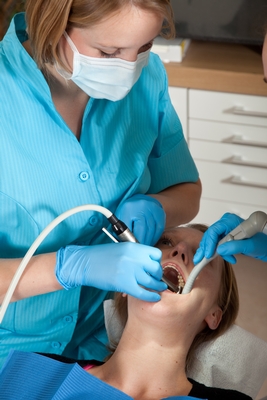 For most people, oral hygiene includes visiting a dentist regularly and brushing and flossing on a daily basis. However, both of these methods only remove a portion of the bacteria and food particles in your mouth. Failure to remove these food particles and bacteria can result in increased plaque production, bad breath, gum disease, tooth decay, and gingivitis. Over the years, dentists and researchers have continued to perform research and studies to help reduce these issues through more than just brushing. A study published in the January 2013 issue of General Dentistry reports that mouth rinsing is just as important as brushing and flossing.
For most people, oral hygiene includes visiting a dentist regularly and brushing and flossing on a daily basis. However, both of these methods only remove a portion of the bacteria and food particles in your mouth. Failure to remove these food particles and bacteria can result in increased plaque production, bad breath, gum disease, tooth decay, and gingivitis. Over the years, dentists and researchers have continued to perform research and studies to help reduce these issues through more than just brushing. A study published in the January 2013 issue of General Dentistry reports that mouth rinsing is just as important as brushing and flossing.
The Science Behind Rinsing
Mouth rinses are an effective tool for combating gum and tooth disease because it reaches the entire mouth. According to the study in General Dentistry, brushing and flossing only reaches approximately 25% of the mouth unless you also brush your teeth, the roof of your mouth, and the cheeks. However, it is very challenging to thoroughly brush this way, and if you’re in a hurry, you’re probably going to skip it. Bacteria can survive brushing and flossing, but vigorous rinsing and swishing are much stronger tools at removing it. Brushing and flossing highly targets small portions of the mouth at once whereas rinsing targets the entire mouth for the whole period.
Mouth rinses actually hit all areas of the mouth. When you do it after a meal, you prevent the food particles from sticking in your mouth and creating plaque, bad breath, and bacteria. Rinse time needs to be a minimum of 30 seconds of vigorous swishing.
Water or Mouth Wash
Germ killing mouth wash is the best choice for killing the bacteria and plaque before it adheres. However, if you don’t have access to mouth wash, you can get some of the same benefits by using tepid water. Take a full mouth full and swish vigorously before spitting. If you are using regular water, you should go for at least 1 minute.
Mouth Conditions
Rinsing your mouth is important, and it can help to prevent a variety of conditions. However, you may be wondering if this method is something that you can use. If you are in doubt, talk to your dentist about any possible issues you might have. However, here are some general facts about rinsing.
If you have dentures, whether partial or full, you can still benefit from rinsing. The tongue, cheeks, and roof of the mouth are the greatest locations for food particles and build-up. You should not start rinsing immediately after a procedure until you have your dentist’s approval. The same is true after you have had any oral surgery.




